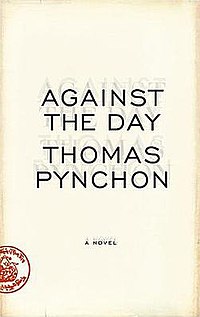Against the Day

First edition cover
|
|
| Author | Thomas Pynchon |
|---|---|
| Country | United States |
| Language | English |
| Genre | Historical novel |
| Published | 2006 (Penguin Press) |
| Media type | Print (hardcover) |
| Pages | 1085 pp |
| ISBN | |
| OCLC | 71173932 |
| 813/.54 22 | |
| LC Class | PS3566.Y55 A73 2006 |
Against the Day is a 2006 historical novel by Thomas Pynchon. The narrative takes place between the 1893 Chicago World's Fair and the time immediately following World War I and features more than a hundred characters spread across the United States, Europe, Mexico, Central Asia, and "one or two places not strictly speaking on the map at all," according to the book jacket blurb written by Pynchon. Like its predecessors, Against the Day is an example of historiographic metafiction or metahistorical romance, and at 1,085 pages it is the longest of Pynchon's novels to date.
Besides appearing within the book itself, the novel's title apparently refers to a verse in the Bible (2 Peter 3:7) reading "the heavens and the earth ... [are] reserved unto fire against the day of judgment and perdition of ungodly men."
William Faulkner, whose diction frequently echoes the King James Bible, liked the phrase, and many reviewers have traced it to a speech of Faulkner's against racism. Perhaps as relevant is a passage in Absalom, Absalom! in which Sutpen, a Faustus character of the sort that Pynchon deploys everywhere, seeks "a wife who not only would consolidate the hiding but could would and did breed him two children to fend and shield both in themselves and in their progeny the brittle bones and tired flesh of an old man against the day when the Creditor would run him to earth for the last time and he couldn't get away." The Creditor there is Mephistopheles, to whom Faustus/Sutpen would owe his soul. (The passage in Gravity's Rainbow about the "black indomitable oven" with which the witch-like Blicero, another Faustus character, is left once the Hansel-and-Gretel-like children have departed, alludes to another passage in Absalom, Absalom!.)
Nonliterary sources for the title may also exist: Contre-jour (literally "against (the) day"), a term in photography referring to backlighting. There are also two uses of the phrase "against the day" in Pynchon's Mason & Dixon, and, anecdotally, three uses in William Gaddis's J R. One may assume that Pynchon has read his Walter Benjamin, who in his famous Theses on the Concept of History XV quotes a satirical ditty composed on the occasion of the July Revolution of 1830, when it was reported that several clock towers across Paris had been fired on: Who would have believed it!/ we are told that new Joshuas/at the foot of every tower,/ as though irritated with time itself*,/ fired at the dials/ in order to stop the day. - * The French makes it clearer: "qu’irrités contre l’heure"
...
Wikipedia
